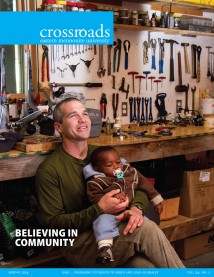When she woke up on May 1, 2008, Denise Martin ’08 was one of the many cyclists who “just kind of rode” without giving much thought to the complicated politics of bicycle advocacy. Things changed later that day when, as she just kind of rode through Harrisonburg, Martin’s wheel was yanked sideways by a skewed railroad crossing on South Main Street. It sent her immediately to the pavement, and soon thereafter, to the emergency room to get patched up.
After finding out that dozens – by a very conservative estimate – of other bikers had also come to grief at that skewed crossing, plus another one across town, she was propelled into action.
“I felt a bit of responsibility. I didn’t want anyone else to get hurt there,” says Martin, who began badgering the city and the railroad to make the crossings safer for bikers.
Improving the crossings had long been on local bikers’ wish-list, and Martin’s persistence nudged the city and the railroad (entities that take a while to get around to things) into final motion. Within months, new, paved paths were built to allow bikers to negotiate the train tracks at a much safer angle.
That quick return, in terms of tangible improvement, on her first advocacy effort turned Martin into a believer. Now a member of the Rockingham County Bicycle Advisory Committee, she is playing a large advising role in the development of the county’s first-ever plan to incorporate safer bicycle and pedestrian features in local road construction and improvement projects.
Working to make her community a better, safer and more enjoyable place to walk or ride a bicycle ties into Martin’s job as a cardiothoracic care nurse at Rockingham Memorial Hospital (she earned her BSN through EMU’s Adult Degree Completion Program).
“I see everybody on the backside of chronic disease, and see the toll it’s taken on their bodies,” she says. “If we can make some positive improvements in our community in terms of health and wellness, some of these things can be prevented.”
“Advocacy is about getting people to think about the kind of place they want to live,” Martin continues. “I think a lot about our kids, and what kind of community we want to build.”
— Andrew Jenner ’04
